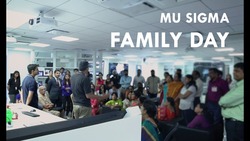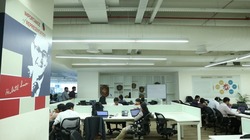Interview Preparation
MU Sigma Test Preparation - Interview Questions

MU Sigma Online Test Pattern And Interview process
In Mu Sigma Test pattern it has 1 online test and after clearing the online tests students are eligible to give interview round. There are 2 interviews round.
Online Written Test Pattern 2023
- Quantitative Aptitude and Logic
- personality and creativity
- Language and Communication
- Video synthesis
- Group Discussion
- The interview
Technical interview
In the Technical interview, generally, they ask questions related to your academic subjects.Some important subject Operating System.If you have good command in any programming language it will be good.
Hr Interview
In an HR interview, they check your communication skills, personality. They ask questions related to your life.
Call To Action
Helping our clients grow while building a more sustainable, more inclusive future is a tough ask. But when you join MU Sigma, you join a thriving company and become part of a diverse global collective of free-thinkers, entrepreneurs and industry experts who are all driven to use technology to reimagine what’s possible. Together, we work to transform the world’s leading businesses while sharing knowledge and pushing ourselves to do better. It’s how we shape great careers and give innovation that human touch the world needs. MU Sigma. Get the future you want.

Mu Sigma is an American data analytics firm providing big data services, decision sciences and helping enterprises in data-driven decision making. The company headquartered in Chicago, Illinois partners with over 140 Fortune 500 companies to enhance their analytical and decision-making capabilities.Lastly, they might try to see how much you know about the company and ask you if you have any questions for them. This is majorly to see your interest in joining the company and your knowledge about the company you want to join.
TRAINING PROVIDED FOR CAPEGEMINI
| Topics | No. of Questions | Allotted Time |
|---|---|---|
| Mu Apt(Logical+ Quants+ Verbal) | 28 | 45 mins |
| General Awareness | 5 | 45 mins |
| Star Question | 2 | 75mins |
| Case Study | 4 | 75mins |
| Pseudo Code | 2 | 30mins |

MU Sigma Pseudo Code Quiz 1
0/100%
Completed

MU Sigma Pseudo Code Quiz 1(a)
0/100%
Completed

MU Sigma Pseudo Code Quiz 1(b)
0/100%
Completed

MU Sigma Pseudo Code Quiz 2
0/100%
Completed

MU Sigma Pseudo Code Quiz 3
0/100%
Completed

MU Sigma Pseudo Code Quiz 4
0/100%
Completed

MU Sigma Pseudo Code Quiz 5
0/100%
Completed

MU Sigma Pseudo Code Quiz 6
0/100%
Completed

MU Sigma Pseudo Code Quiz 7
0/100%
Completed

MU Sigma Pseudo Code Quiz 8
0/100%
Completed

Questions on Data Structure
0/100%
Completed
WORKING ON
Artificial Intelligence
Artificial intelligence is the simulation of human intelligence processes by machines, especially computer systems. Specific applications of AI include expert systems, natural language processing, speech recognition and machine vision.
Business Services
Business services is a general term that describes work that supports a business but does not produce a tangible commodity. Information technology (IT) is an important business service that supports many other business services such as procurement, shipping and finance.
Cloud Services
Cloud services facilitate the flow of user data from front-end clients (e.g., users' servers, tablets, desktops, laptops—anything on the users' ends), through the internet, to the provider's systems, and back. Cloud services promote the building of cloud-native applications and the flexibility of working in the cloud
CyberSecurity Services
Cyber Security Services provides cybersecurity solutions and risk assessment services to prevent cyber attacks and meet compliance objectives.
Digital Services
Digital Services is a term that refers to the electronic transfer of information including data and content across numerous platforms and devices like web or mobile.
Intelligent Industry
Defining Intelligent Industry. At its simplest Intelligent Industry means harnessing the power of data to foster innovation, make new and differentiated 'smart' products, improve supply chains, create new customer experiences and deliver new sources of value.
Technology Solutions
Types of technology include mechanical technology, medical technology, communications technology, electronic technology, and industrial and manufacturing technologies.



